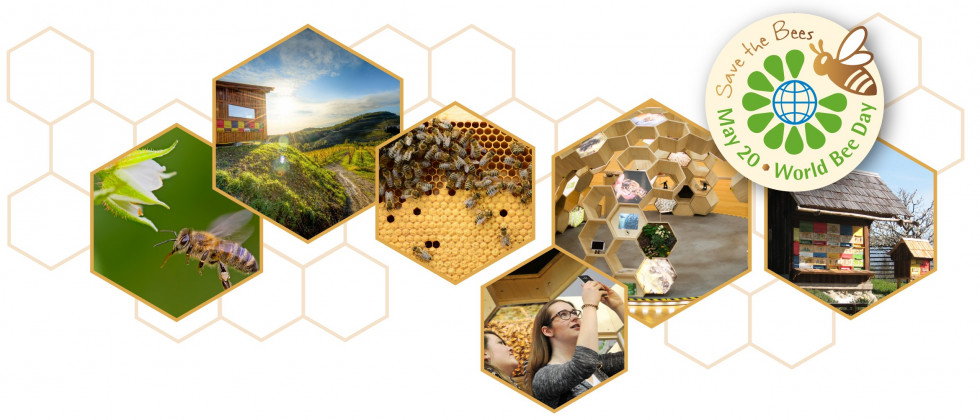20 December marks the 6th anniversary of the proclamation of World Bee Day in the UN
Bee are increasingly threatened. While bees are threatened with extinction in Europe, pollinator numbers, in general, are declining globally. The situation is sometimes referred to as "pollination crisis". In 2014, the Ministry of Agriculture, Forestry and Food began activities to proclaim World Bee Day at the initiative of the Slovenian Beekeepers’ Association. Years of work and collaboration among various line ministries and partners, seeking global support, culminated in one of the most significant diplomatic achievements. After three years of international efforts, the United Nations Member States unanimously backed Slovenia's proposal on 20 December 2017 and declared 20 May as World Bee Day.
Why Slovenia?
Slovenians have always been a nation of beekeepers. Slovenia ranks among the global leaders with almost five beekeepers per 1,000 inhabitants. Beekeeping is an important agricultural activity with a longstanding tradition in Slovenia. Slovenian beekeepers are globally recognized for their expertise, advanced beekeeping technologies, and the unique historical characteristics that distinguish Slovenian beekeeping.
The Carniolan honey bee (Apis mellifera carnica) is integral to the Slovenian national identity. Beekeeping, a way of life for tens of thousands of Slovenians, is deeply ingrained in tradition. Slovenia was among the first European Union Member States to legally safeguard bees and among the first in the European Union to prohibit the use of certain pesticides harmful to bees within its territory in 2011.
Why is 20 May World Bee Day?
The month of May is a month of bees. It is the time when bees are most active in the northern hemisphere. As their colonies expand, bees begin to swarm, which is their natural method of reproduction. The bee population is at its peak in May, coinciding with the highest demand for pollination. In the southern hemisphere, it is autumn, a season for harvesting bee products, marking the days and weeks of honey.
Furthermore, 20 May marks the birthdate of Anton Janša (1734–1773), who is considered a pioneer of modern beekeeping and one of the greatest experts in the field during his era. He also served as a beekeeping instructor at the Austrian imperial court.
International Golden Bee Award
In conjunction with various measures and events aimed at raising awareness among the public, youth and farmers about the significance of bee preservation and bee products that promote nature-friendly practices, Slovenia hosts the annual internationally recognised Golden Bee Award. It is the highest national award recognising contributions to preserving and protecting bees and other pollinators. The award promotes outstanding individuals who have made significant contributions to innovation, research on bees and other pollinators, as well as efforts in raising awareness and enhancing visibility in the field.
Tomorrow, at 16.00, a ceremony will be held at Dom na Vidmu in Ilirska Bistrica, organized by the Municipality of Ilirska Bistrica in collaboration with the Slovenian Beekeepers’ Association and the Ilirska Bistrica Beekeeping Club, to commemorate the proclamation of World Bee Day by the United Nations in 2017. Ilirska Bistrica was the home of Anton Žnideršič (1874–1947), a renowned and highly dedicated beekeeper, beekeeping entrepreneur, innovator and the author of the AZ hives. The event will be an opportunity to present the design of a modern multimedia interpretation centre dedicated to Anton Žnideršič. His hive, inspired by Alberti's concept of a leaf hive, was publicly presented in 1910, sparking a revolution and a flourishing period in Slovenian beekeeping.
More information:


